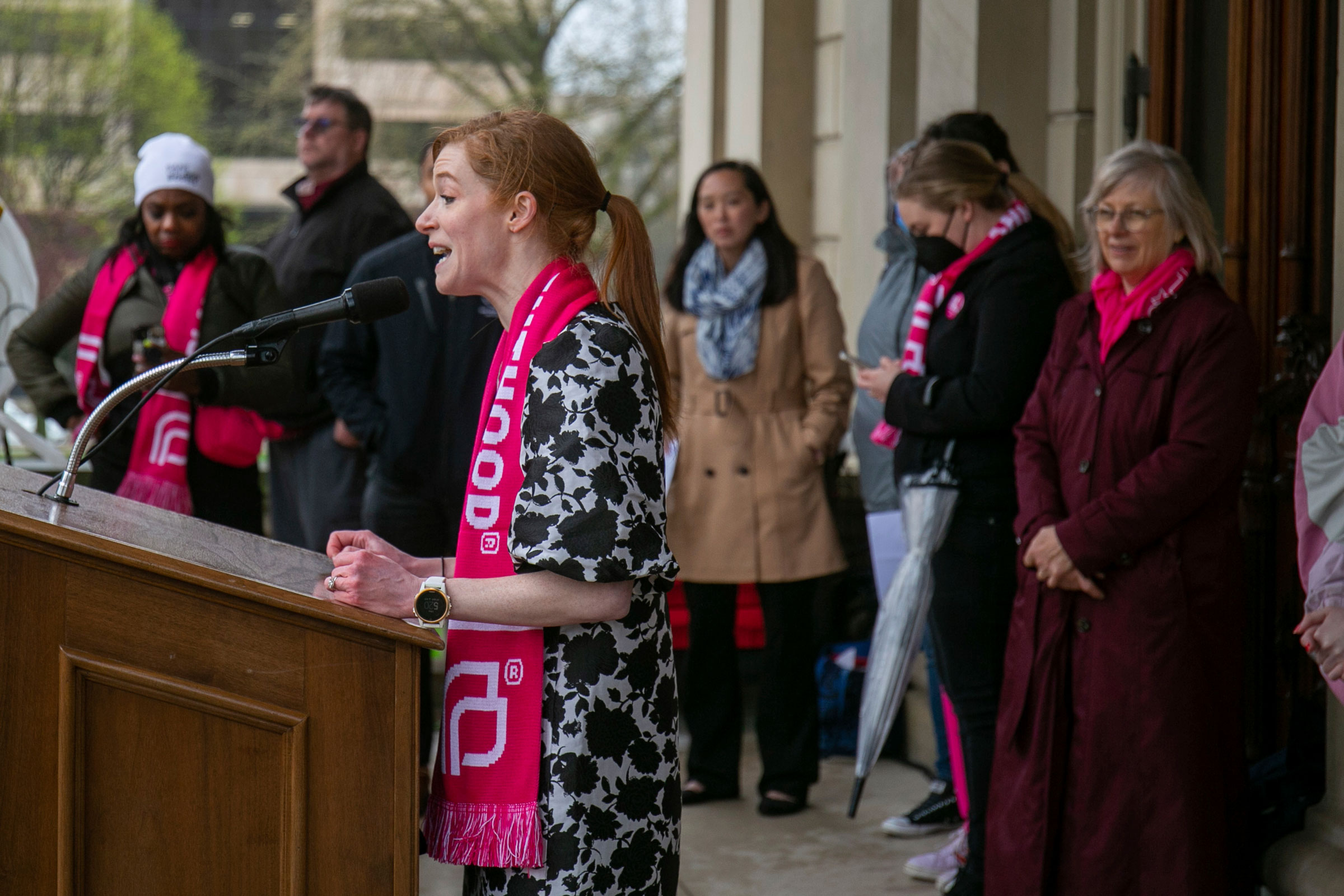
All Michigan state senator Mallory McMorrow wanted was to flip her chamber of the legislature towards Democrats.
McMorrow—who won national attention for her viral response to right-wing smears — knew that abortion would be pivotal to almost all races in the state. In addition to the governor’s race and house races, Michigan voters were also weighing Proposal 3, a ballot initiative to amend the state constitution to protect abortion rights. She began to see otherwise apolitical friends supporting the ballot measure on Instagram. Still, even as McMorrow remained confident about some Democrats’ chances in Michigan, the conventional wisdom was that Democrats were facing an uphill battle due to a sluggish economy and a sour national mood.
But on Tuesday, Michigan voters not only overwhelmingly approved Proposal 3, they also re-elected Democratic Governor Gretchen Whitmer, along with other Democratic women statewide officials like Attorney General Dana Nessel and Secretary of State Jocelyn Benson. They re-elected Rep. Elissa Slotkin, who was defending a vulnerable Democratic seat. And in a surprise even to officials like McMorrow, they delivered Democrats not only the state senate, but the state house as well.
“I did not expect that we would get a trifecta,” says McMorrow. “I don’t think any polling captured how angry and energized people still were.”
State rep. Darrin Camilleri, a Democrat who won a seat in the state senate Tuesday night, says that after knocking on 130,000 doors, he thinks abortion was the deciding factor in turning Michigan deep blue. “It drove turnout in ways that we did not expect,” he says.
What happened in Michigan was just the most visible example of a phenomenon that reverberated across the country since the Supreme Court’s decision in June to overturn half a century of abortion rights. Voters who supported reproductive freedom turned out for Democrats in the midterms, blunting what was widely expected to be a Republican wave. Abortion came in a close second to inflation as voters’ most important issue, according to NBC News exit polls, with 76% of Democrats listing abortion as their top concern. Among women voters, white college educated voters, early voters, and Latino voters, abortion was their number one issue, according to the NBC exit polls. More than 6 in 10 voters— including 27% of Republicans— said they were dissatisfied with the Supreme Court’s Dobbs v. Jackson Women’s Health Organization decision that overturned Roe v. Wade. And while it may be days until there is solid data on youth turnout, veteran pollster John Della Volpe says his surveys showed that young women and college students boosted their enthusiasm in the aftermath of Dobbs, potentially enough to offset the conservative voters in older generations in certain races.
Read More: Here Are the Latest Updates on Midterm Election Results
The emphasis on abortion put Republicans on the defensive in key statewide races like Pennsylvania, while boosting Democrats’ chances in tight congressional districts they had expected to lose. “Democrats defied the laws of political gravity last night in the best way,” says McKenzie Wilson, communications director for progressive data firm Data for Progress. “And clearly the Dobbs decision was the fundamental reason why.”
That led to big wins for reproductive rights, both in political races and in votes where the rights themselves were on the ballot. In all five states with abortion-related ballot referendums on Nov. 8, the abortion-rights position was on track to win clear victories, even in deep-red states. In addition to Michigan, voters struck down an amendment in Kentucky that would infringe on abortion rights, and are on track to do the same in Montana. “If you’re the anti-abortion movement and you can’t win a vote like that in Kentucky, the question is can you win a vote like that anywhere?” says Mary Ziegler, a professor at UC Davis School of Law who has written four books about the politics of abortion.
The timing of the Supreme Court’s Dobbs decision meant that Republicans “were dealt a bad hand politically,” says Republican strategist Ron Bonjean. “The abortion issue really helped Democrats at a time when there wasn’t much out there to stoke voter interest in voting for their party.”
After the Dobbs decision, Republicans have passed a cascade of abortion restrictions around the country that limit the procedure in some states to six weeks of pregnancy, sometimes with very limited exceptions. The Dobbs decision and ensuing fallout allowed Democrats to make the case that the GOP was extreme on abortion, sometimes limiting the procedure even in cases of rape and incest—a highly unpopular position rejected by a wide majority of voters. “There’s a limit to what voters will accept,” says Democratic strategist Tyler Law.
In Michigan, that meant the battle to protect reproductive rights has delivered Democrats unified control of a state Donald Trump won in 2016 for the first time in almost 40 years. “This is an entirely new state for the first time in our lifetime,” says McMorrow. “This felt like the ‘do not mess with those women from Michigan’ campaign.”
More Must-Reads From TIME
- The 100 Most Influential People of 2024
- The Revolution of Yulia Navalnaya
- 6 Compliments That Land Every Time
- What's the Deal With the Bitcoin Halving?
- If You're Dating Right Now , You're Brave: Column
- The AI That Could Heal a Divided Internet
- Fallout Is a Brilliant Model for the Future of Video Game Adaptations
- Want Weekly Recs on What to Watch, Read, and More? Sign Up for Worth Your Time
Write to Charlotte Alter at charlotte.alter@time.com